Regional Science and Policy Forum on R2R/WEM Approach
to CLUP and PDPFP
(Ilocos Region)
The WILUP team, in collaboration with the Provincial Government of La Union (PGLU), organized a “Regional Science and Policy Forum on R2R/WEM Approach to CLUP and PDPFP” tailored for the Ilocos Region. Convened on November 23, 2023, at Hotel Ariana in Bauang, La Union, the event brought together 119 participants, including provincial, municipal and city planners from the province of La Union as well as representatives from Region 1 government agencies – National Irrigation Administration (NIA), Department of Environment and Natural Resources (DENR), Department of Tourism (DOT), National Commission on Indigenous Peoples. (NCIP), Department of Agrarian Reform (DAR), Department of the Interior and Local Government (DILG), Department of Human Settlements and Urban Development (DHSUD), National Economic and Development Authority (NEDA), Department of Trade and Industry (DTI), and the Department of Public Works and Highways (DPWH), and the central office of the Department of Transportation (DOTr).
On the other hand, State Universities and Colleges (SUCs) offering BS Forestry and Environmental Science programs from Region 1, especially the Don Mariano Marcos Memorial State University NLUC Campus (DMMMSU-NLUC) and the University of Northern Philippines (UNP), have shown their support to the forum by participating in the discussion. Civil Society Organizations (CSOs) and Non-Government Organizations based in La Union such as the Lupon ng mga Indibidwal na Nangangalaga ng Kalikasan, INC. and the Coastal Underwater Resource Management Actions were also present in the said event. Moreover, some provincial planners from Region 1, particularly from the Provincial Government of Pangasinan engaged in the discussion during the forum.
The regional forum served as a platform for engaging discussions on the practical insights, successful methodologies, and emerging challenges associated with implementing the R2R/WEM approach in the development and revision of Comprehensive Land Use Plans (CLUPs) and Provincial Development and Physical Framework Plans (PDPFPs). The forum aimed to mainstream the R2R/WEM approach through the DENR, NEDA, DHSUD, DILG, and WILUP-UPLB presentations.
After the presentations, the participants were divided into groups based on their agency or institution – LGUs, PLGUs, Regional Agencies, SUCs, and CSOs – to engage in a breakout discussion and respond to questions relating to their roles in the preparation of sectoral plans such as the CLUP and PDPFP. During the afternoon session, the participants were asked to gauge their comprehension of the R2R/WEM approach to land use planning. The workshop’s outcome will play a pivotal role in determining the roles and responsibilities of the various stakeholders involved in preparing and formulating sectoral plans, with particular emphasis on the successful integration of the R2R/WEM Approach.
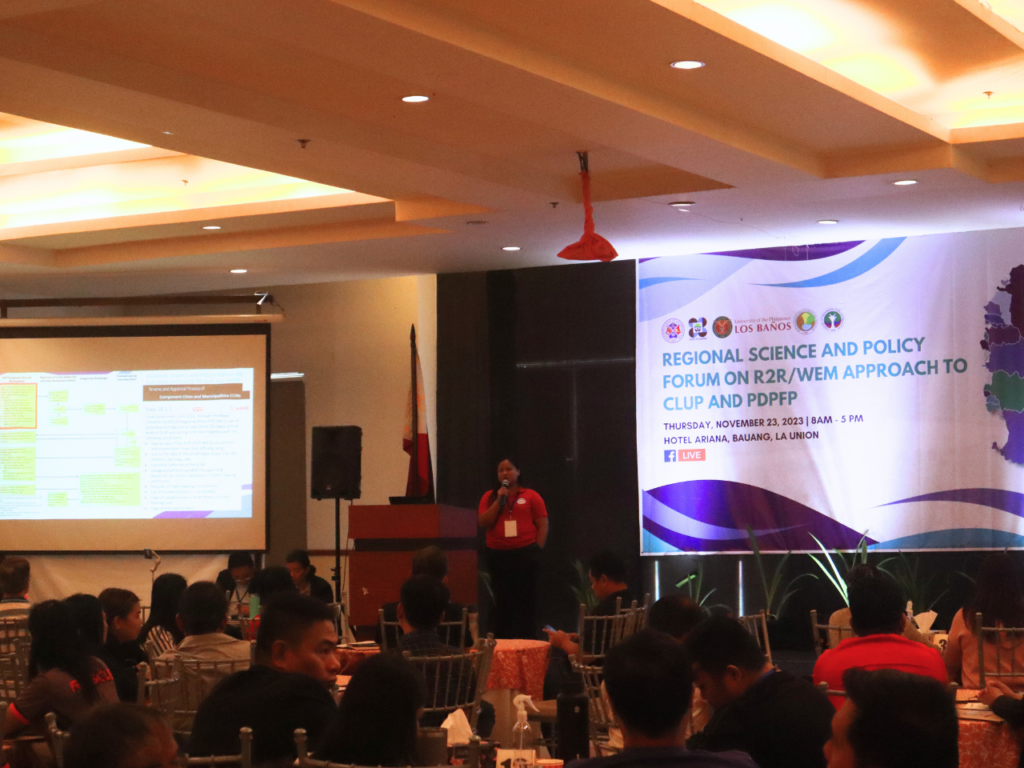
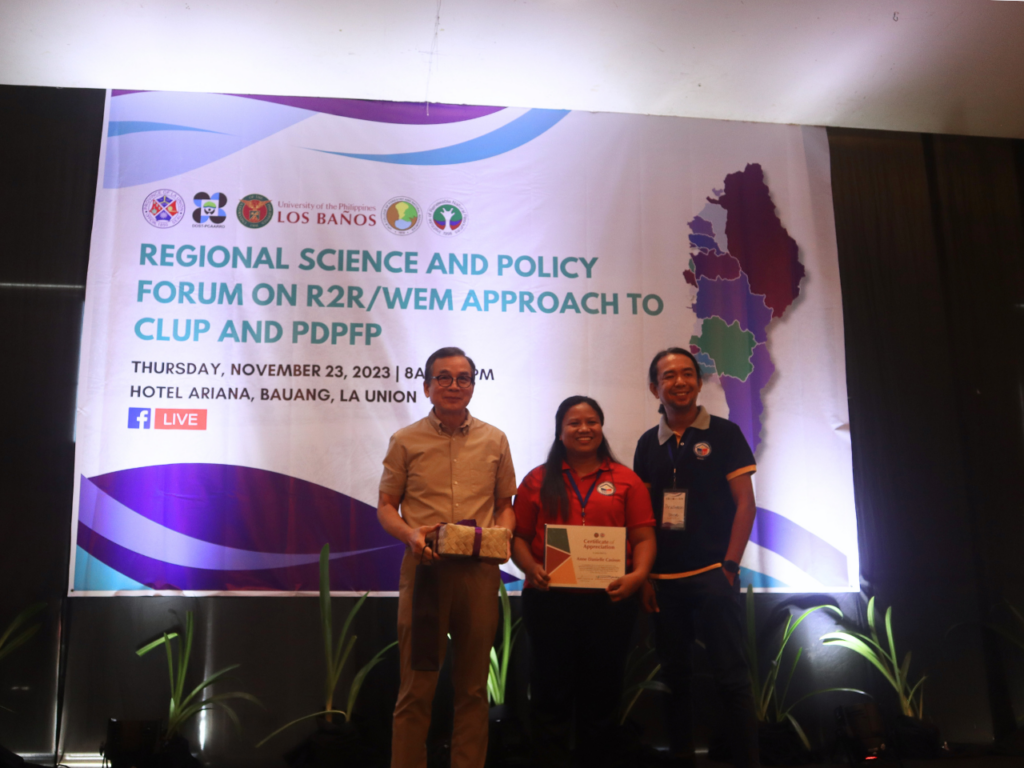
Engr. Anne Danielle Casison-Fabro talked about the key factors behind the extended approval process of CLUP.
Engr. Anne Danielle Casison-Fabro, from the Department of Human Settlements and Urban Development (DHSUD) Region 1 – representing the Environmental, Land Use, and Urban Planning & Development Division (ELUPDD), delved into the prevalent factors contributing to the prolonged approval timeline of CLUP.
During her presentation, Engr. Casison-Fabro underscored the critical role of document completeness and the inadequacy of essential datasets, such as vector files for maps, in the initial stages of CLUP preparation.
Engr. Casison-Fabro then reinforced that the department is now involved in reviewing the CLUPs of the LGUs to ensure compliance with the Housing and Land Use Regulatory Board (HLURB) guidelines in preparing these plans. Additionally, she elucidated that Local Government Units encounter a significant hurdle in adhering to the comments and recommendations put forth by the Provincial Land Use Committee. The delayed compliance further prolongs the review and approval processes.
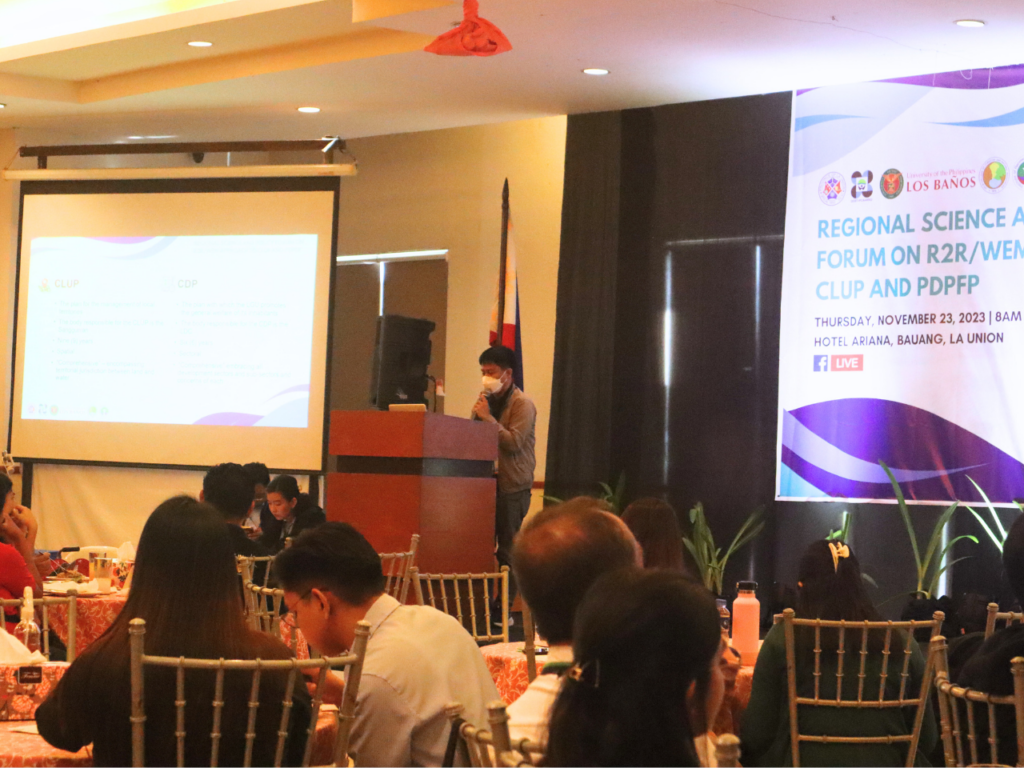
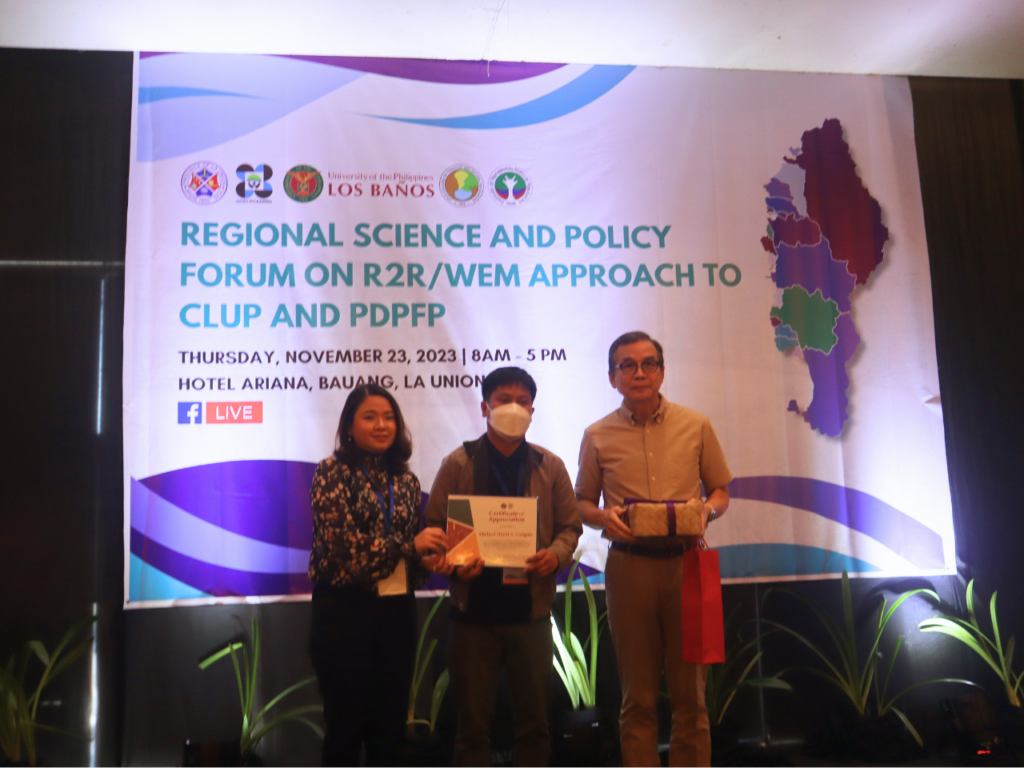
Mr. Michael David Casignia spoke about the difficulties in overseeing the approval process for CDP formulation.
Mr. Michael David Casignia, the designated Comprehensive Development Plan (CDP) Focal Person at the Department of the Interior and Local Government (DILG) Region 1, addressed the challenges associated with monitoring the approval process of CDP formulation.
Among the hurdles highlighted by Mr. Casignia are the insufficiency of CDP experts within Region 1, the dearth of dedicated staff solely focused on monitoring and coordinating CDP-related activities, limited funds allocated from the central office that can only accommodate a limited number of Local Government Units (LGUs), and the scarcity of technical personnel within LGUs capable of supporting Local Planning and Development Coordinators (LPDCs) in formulating and updating CDPs.
In response to these challenges, Mr. Casignia detailed the measures taken by DILG Region 1. These initiatives include the organization of regional training sessions, establishment of provincial teams and coaches, collaboration with academic institutions to provide a Management Course for Local Officials and Functionaries, implementation of regional training programs on CDP formulation, and the development of monitoring templates.
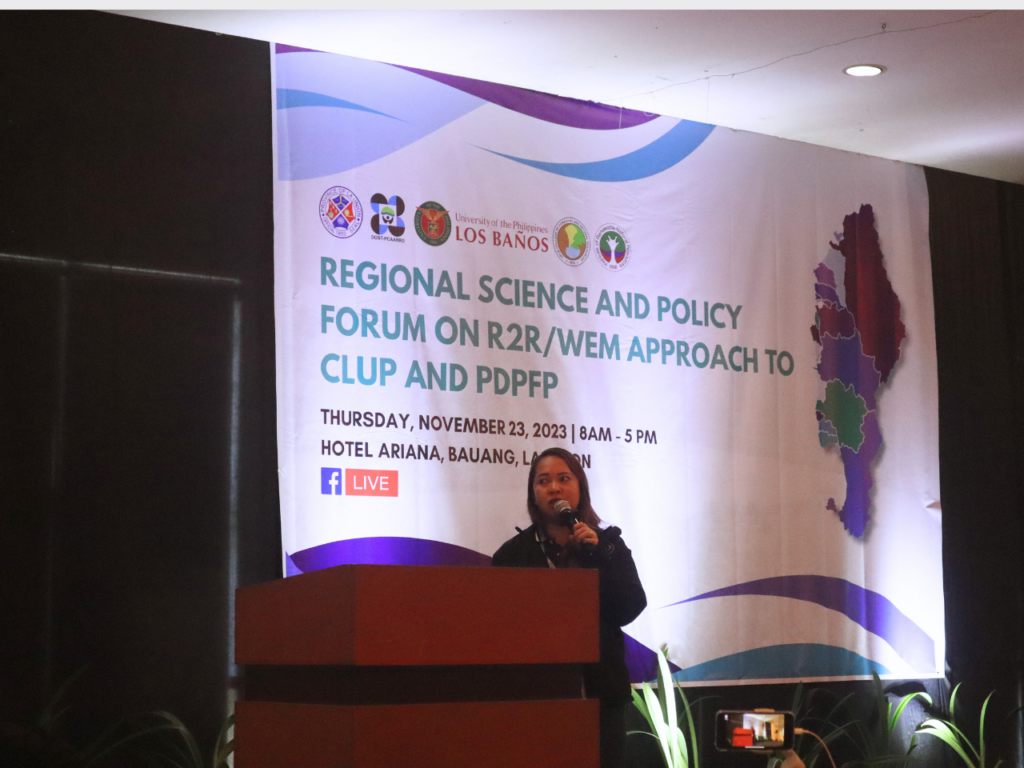
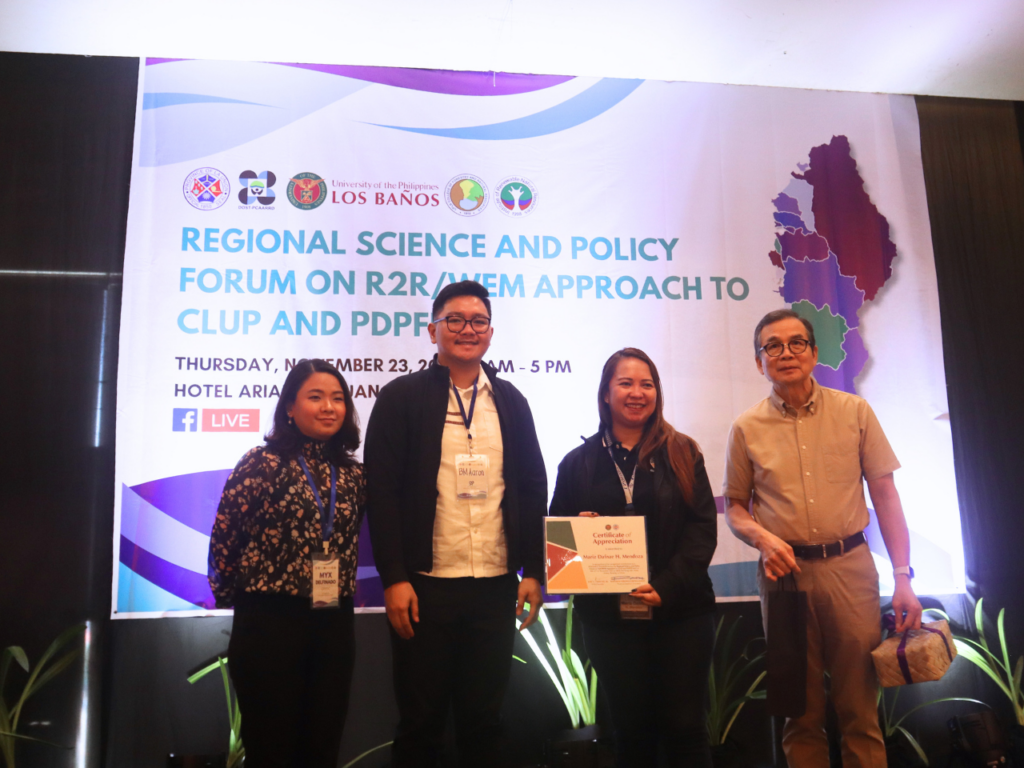
Ms. Mariz Dafnae H. Mendoza presented the challenges and opportunities to strengthen the alignment of LGU Development Plans with Regional Development Plans
Ms. Mariz Dafnae H. Mendoza, Officer-in-charge Supervising Economic Development Specialist in Policy Formulation and Planning Division of National Economic and Development Authority (NEDA) Region 1, discussed the challenges and opportunities to strengthen the alignment of LGU Development Plans with Regional Development Plan (RDP).
Among the issues and challenges detailed by Ms. Mendoza are the divergent priority thrusts of LGUs, the lack of data essential for effective planning and decision-making, insufficient representation of LGUs in development planning-related bodies and activities, and the need of technical experts for planning and monitoring.
In terms of recommendations to fortify the alignment of Local Development Plans with the DP 2023-2028, Ms. Mendoza proposed the implementation of consultation and promotional activities. Additionally, she emphasized the value of providing technical assistance to LGUs in the realm of development planning.
Furthermore, Ms. Mendoza outlined ways in which LGUs can become integral partners in RDP implementation. This includes extending support through data collection and processing, active participation in the execution of identified Priority Programs and Activities (PPAs), monitoring of PPAs and provincial targets, and engagement in consultations and capacity-building activities.
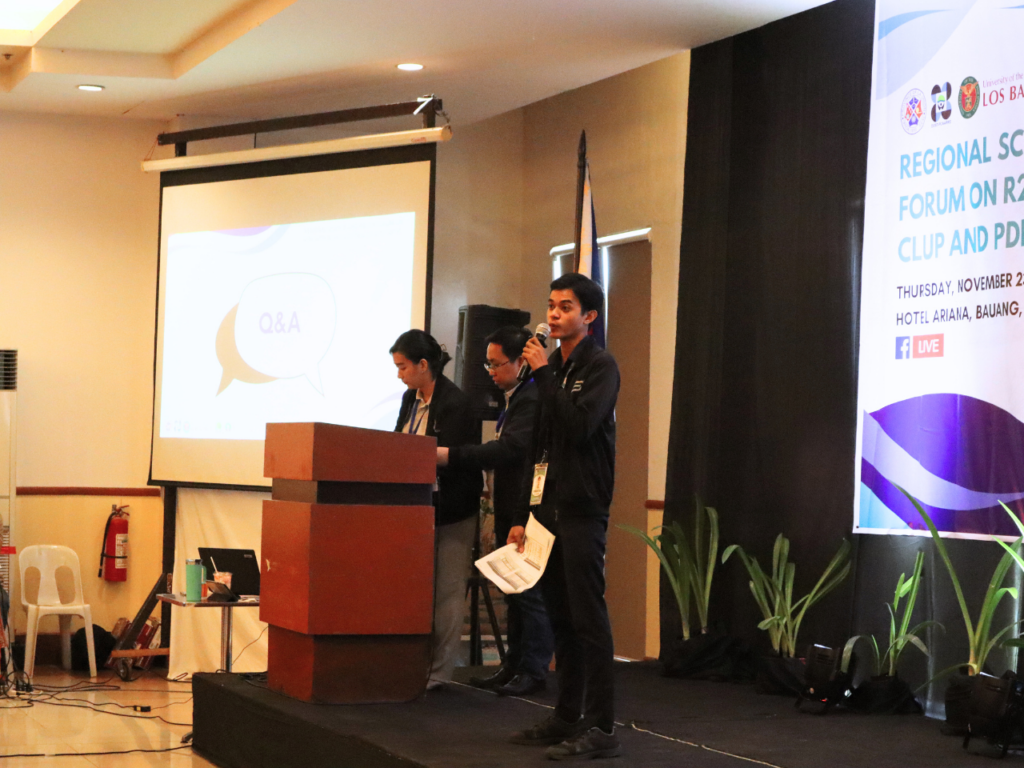
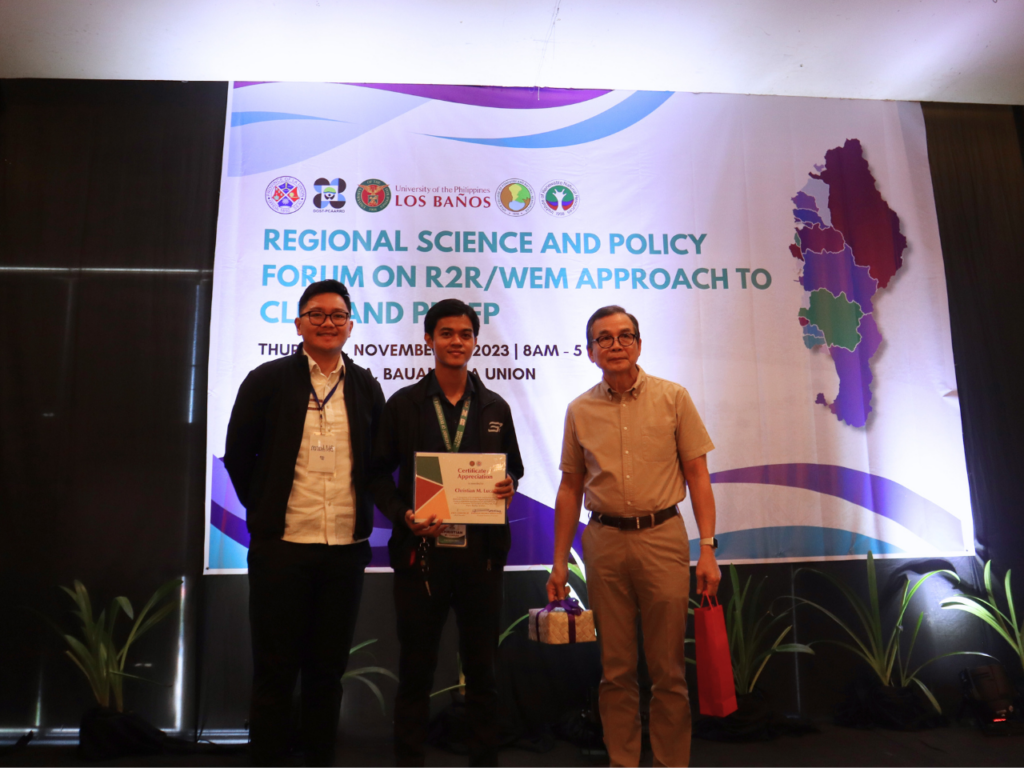
For. Christian M. Lucas explained the steps and procedures for preparing IWMP and River Basin Master Plans.
For. Christian M. Lucas from the Planning and Management Division of the Department of Environment and Natural Resources – Region 1, represented the agency in presenting the guidelines and processes in preparing the Integrated Watershed Management Plan (IWMP) and the River Basin Master Plans.
During the discussion, one of the issues raised was the need to update the watershed database. This update is crucial to the planning and decision-making processes, particularly in watershed management. According to For. Lucas, the department is mandated to update plans every 5 to 10 years, taking into account changes and developments in the area during the decision-making process. He then highlighted that the master plans for the three (3) critical watersheds in La Union (Baroro, Aringay and Q) are currently for updating. The primary objective of this update is to conduct Characterization and Vulnerability Assessment (CVA) of these watersheds. LGUs can now use the results of assessments conducted by this agency as a basis for their planning.
The Integrated Coastal Management (ICM) plans within the province of La Union is also cited during the open forum. The DENR mentioned that all LGUs situated in coastal zones are required to formulate their ICM plans. A representative from the Provincial Environment and Natural Resources Office (PENRO) in La Union confirmed that all coastal LGUs in the province have already formulated their ICMs with assistance from the DENR Region Office’s Conservation and Development section.
